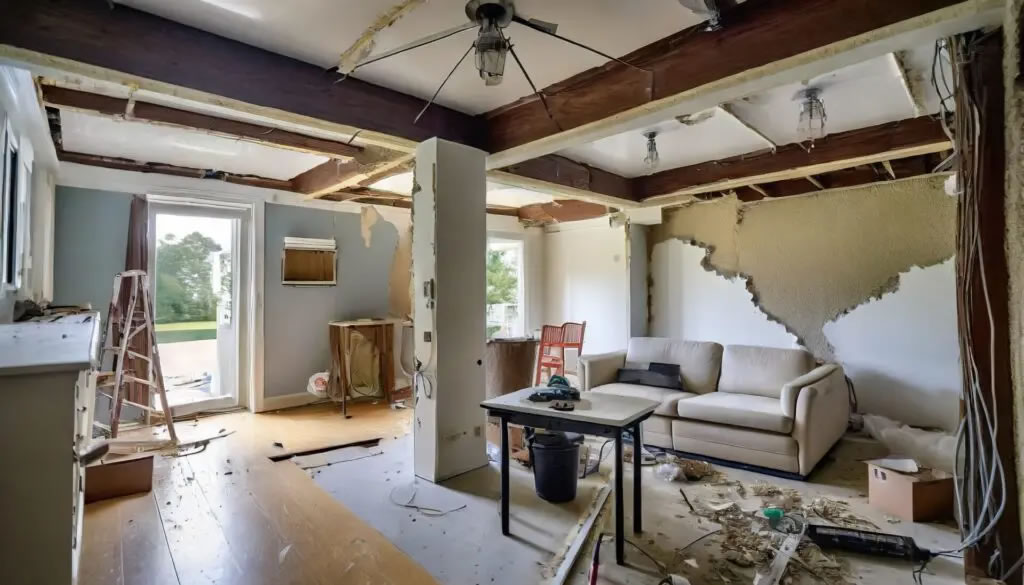Water damage is a common issue that many homeowners face, often arising from leaks, flooding, or burst pipes. Even though water damage can seem like a small annoyance, if it is not properly and quickly managed, the hidden risks associated with it can cause serious issues. Understanding these dangers and knowing why professional help is crucial can save your home and health from severe consequences.
The Immediate Effects of Water Damage
When water infiltrates your home, the immediate effects are usually visible. You might notice wet carpets, soggy furniture, and standing water. These are just the surface issues; beneath them lie more severe problems that can escalate quickly.
Structural Damage
Water can damage your home’s structural stability. Water absorption by wooden beams and drywall causes swelling, warping, and finally destruction. Wooden beams and drywall absorb water, leading to swelling, warping, and eventual disintegration. If left unchecked, this can compromise the stability of your home’s framework, leading to costly repairs and potential safety hazards.
Electrical Hazards
Combining electricity with water may be hazardous. Water intrusion into electrical systems can result in power outages, fires, and short circuits. Exposed wiring in contact with water poses a significant risk of electric shock. It’s vital to shut off the power supply and seek professional assistance to manage and repair water-damaged electrical components.
The Hidden Dangers Lurking Below the Surface
While the immediate effects of water damage are concerning, the hidden dangers that develop over time are even more alarming. These dangers can affect your home and health long after the initial incident.
Mold and Mildew Growth
Mold development is one of the sneakiest effects of water damage. After contact with water, mold can start growing in as little as 24 to 48 hours since it loves moist conditions. Mold spores can spread rapidly through your home, affecting walls, floors, ceilings, and HVAC systems.
Mold not only damages the surfaces it grows on but also poses serious health risks. If someone has asthma or a compromised immune system, mold exposure can worsen their respiratory conditions, trigger allergic responses, and cause other health concerns.
Bacterial Contamination
Water damage, particularly from flooding or sewage backups, can introduce harmful bacteria into your home. Contaminated water carries pathogens that can cause illnesses and infections. Proper sanitation and disinfection are essential to eliminate these hazards and ensure your home is safe for occupancy.
Hidden Rot and Decay
Even after visible water has been removed, moisture can remain trapped in walls, floors, and other hidden areas. This lingering moisture promotes the decay of building materials, leading to wood rot and corrosion of metal components. This may eventually lead to serious structural damage that needs expensive repairs.
Why You Need Professional Help
Given the immediate and hidden dangers of water damage, it’s clear that addressing the issue promptly and thoroughly is crucial. Although some homeowners might try to handle water damage on their own, there are a number of reasons why getting expert assistance is crucial.
Comprehensive Assessment
Professionals can analyze the water damage thoroughly since they have the knowledge and resources to do so. The degree of the damage, including any concealed moisture and mold development that would not be apparent to the naked eye, can be determined by them. This comprehensive assessment ensures that all affected areas are addressed, preventing future problems.
Efficient Water Removal and Drying
Professional water damage restoration teams use advanced equipment to remove water quickly and efficiently. High-powered pumps, vacuums, and dehumidifiers are essential for thorough drying, which is critical to prevent mold growth and further structural damage. Professionals can also use thermal imaging and moisture meters to ensure that no hidden moisture is left behind.
Mold Remediation
If mold is present, professional remediation is necessary to safely and effectively remove it. Mold remediation specialists use specialized techniques and protective gear to contain and eliminate mold, preventing it from spreading to other areas of your home. They also treat affected surfaces to inhibit future mold growth.
Sanitation and Disinfection
Professionals use industrial-grade cleaning agents to sanitize and disinfect areas affected by water damage. This is especially important in cases of bacterial contamination from sewage or floodwater. Proper sanitation ensures that your home is safe and free from harmful pathogens.
Structural Repairs
Addressing structural damage requires expertise in construction and repair. Professionals can assess the extent of structural damage and perform necessary repairs to restore the integrity of your home. This includes replacing damaged drywall, reinforcing weakened beams, and repairing compromised electrical systems.
Insurance Assistance
Navigating insurance claims for water damage can be complex and time-consuming. Many professional restoration companies offer assistance with the claims process, helping you document the damage and communicate with your insurance company. This can expedite the claims process and ensure you receive the compensation you need for repairs.
Conclusion
Water damage is more than just a minor inconvenience; it poses serious risks to your home and health. The hidden dangers, such as mold growth, bacterial contamination, and structural decay, underscore the importance of addressing water damage promptly and thoroughly. Professional help is crucial for a comprehensive assessment, efficient water removal, mold remediation, sanitation, and structural repairs.
If you experience water damage, seeking professional assistance from a water damage restoration Grand Rapids is essential. Their expertise and advanced equipment can help ensure your home is restored to a safe and habitable condition. Don’t underestimate the hidden dangers of water damage—take action to protect your home and health

